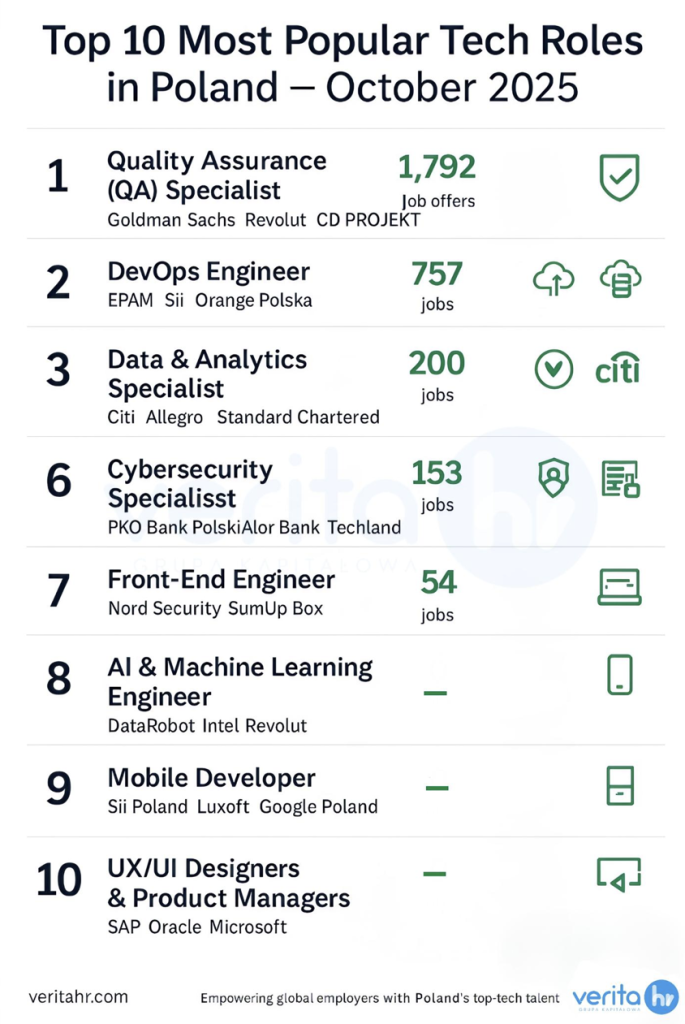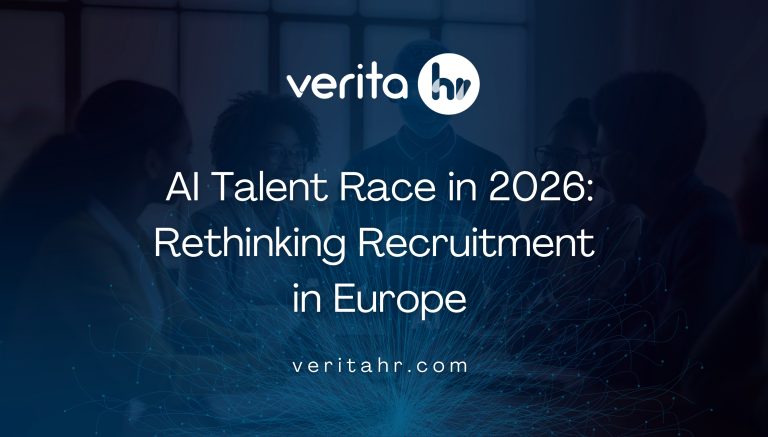Poland’s tech job market continues its strong rebound in 2025, with IT vacancies up 68% year-on-year (YoY). Demand has changed with companies looking for more specialised employees, led by roles in data, AI, cybersecurity, and cloud infrastructure. Data and analytics alone now represent nearly 10% of all tech job adverts, followed closely by Java, JavaScript, and DevOps engineering. As multinational firms expand across cities in Poland, competition for skilled professionals is intensifying.
As the tech industry has matured since Poland joined the EU, Polish developers and engineers continue to be in high demand. For over ten years now the Polish Java developer has been in huge demand, importantly, this type of engineer still doesn’t know how to use JavaScript. Contrary to what talent, HR or business leaders think, let’s dive into the most popular roles for tech specialists in Poland today.
Front-End Engineer
Front-end engineers are seen by many as the face of digital transformation. Their mastery of JavaScript, React, and TypeScript keeps them at the heart of Poland’s tech hiring. A leading job portal recently listed over 1,200 Polish openings requiring JavaScript, even more than for Java developers.
Meanwhile, per a Verita HR report, Poland has only 54 active front-end offers, spread around Warsaw, Kraków and other cities in Poland, at the time of writing.
Companies such as Nord Security, SumUp, Doodle, JTI, Autodesk, Playson, edenity, Orchid (YC W23), Calyptus, myGwork – LGBTQ+ Business Community, Canonical, ClickUp, Riverside, Adecco, Joinrs, Nuitée, and Focal Systems, are expanding front-end teams to improve UX for millions of users.
As AI tools integrate into design workflows, engineers capable of building intuitive, responsive interfaces are among the country’s most sought-after developers.

Back-End Engineer
The invisible architecture behind every digital service depends on back-end engineers. Java, Python, and C# remain dominant, powering enterprise applications and SaaS systems.
“We are not seeing a drop in demand for candidates with expertise in Java,” says Milena Górka, Senior IT Recruitment Expert at Verita HR Group.
Poland has over 8.1K candidates for this role with 207 job offers currently available across employers like Luxoft, Zendesk, Urban Digital Recruitment, Consensys, Astellas Pharma, DataRobot, Bolt, Prisma, Deel, TechTree, Voodoo, and Mozilla are among employers expanding their server-side teams to support new AI-driven products and APIs.
These engineers keep critical systems secure, scalable, and reliable, skills that never go out of fashion.
DevOps Engineer
DevOps continues to rank among Poland’s top five most-advertised IT roles, second only to general software developers. As firms modernize infrastructure, professionals fluent in Kubernetes, Docker, and CI/CD automation are indispensable.
Poland posted 757 DevOps listings overall, including 356 in Warsaw. Kraków followed with 260, while Wrocław showed 211 opportunities. Organizations like EPAM, Objectivity, Box, SHERPANY, Capgemini, LoopMe, Astek, Gitlab, and Kraken lead the charge, hiring engineers to streamline deployments and manage hybrid cloud platforms.
Over half of global companies cite DevOps as a hiring priority, a trend mirrored locally, where these specialists bridge code and operations, cutting delivery times while boosting system resilience.
AI & Machine Learning Engineer
Artificial Intelligence has transformed the Polish tech landscape. The first half of 2025 saw a steep increase in AI-related hiring especially in Q2 as firms invested in predictive analytics and generative systems. Google’s $5 million initiative to train one million young Poles in AI and cybersecurity highlights how strategically important these skills have become.
From banking to healthtech, companies are racing to onboard engineers capable of building and deploying intelligent models.
With 16K+ candidates in Poland for AI & Machine Learning Engineer roles, Warsaw tops the list with demands from companies now competing for the same limited AI talent pool, pushing wages and research budgets higher.
Data & Analytics Specialist
Data is often touted as “the new oil,” and Polish employers are drilling deeper than ever. BI analysts, data engineers, and big data specialists account for nearly one-in-ten IT openings. Recent market data showed that data-focused roles comprised about 9–10% of all IT job ads, the single largest category.
Poland had around 200 openings for data and analytics professionals, with 100 in Warsaw. Kraków listed 75 roles, while Wrocław recorded 28 new roles. Firms from Nielsen to Allegro to Aceolution to Uber to CloudPay and Hays are scaling analytics teams that turn raw data into insight. SQL, Python, and Power BI remain must-have skills, while cloud-native data pipelines are quickly becoming the standard.
Salaries for senior analysts have risen more than 15% since early 2024, which tells much about the premium on evidence-based business decision-making.
Cybersecurity Specialist
Cybersecurity sits at the intersection of risk and reputation, and Poland faces a shortfall of around 10,000 security experts, the Polish Chamber of IT and Telecom estimates. Over 1,300 vacancies were listed in as of writing, spanning SOC analysts, cloud-security engineers, and penetration testers.
“In the four years I’ve been with Verita HR Group… demand for cybersecurity professionals constantly increase,” says Daria Mojzesz, Junior Key Account Manager and Senior HR Projects Co-ordinator at Verita HR Group.
Warsaw, for example, featured 86 cybersecurity listings, with companies like UBS, Bybit, Visa, PKO Bank Polski, Alior Bank SA, Mediatech, and HSBC racing to harden defenses amid rising ransomware and phishing threats.
Global investment including Google’s new cyber-training program signals how crucial this workforce has become.
Quality Assurance (QA) Specialist
With digital products rolling out faster than ever, QA engineers remain indispensable. Verita HR’s October review found roughly 1,800 QA roles open nationwide, spanning automation testers, performance engineers, and QA leads.
Employers such as Goldman Sachs, Deloitte, Comarch, Revolut, PwC Polska, TransPerfect Life Sciences, and CD PROJEKT rely on Polish QA professionals to maintain software reliability. Poland has over 27K candidates for this role.
Automation frameworks like Selenium, Cypress, and Playwright are now baseline expectations, while experience integrating testing into CI/CD pipelines can double candidate visibility.
Mobile Developer
Poland’s booming app economy keeps mobile developers in constant demand. Warsaw accounts for nearly 60% of all mobile openings, followed by Kraków and Wrocław.
Per data by the Verita HR team and KAM, Mobile Devs demand in Poland generally hit 12K+ candidates, with various companies recruiting Android and iOS engineers to power fintech, e-commerce, and gaming apps.
Roughly 70% of openings target mid-to-senior talent, reflecting employers’ need for experienced coders who can balance performance with user-centric design. The rise of cross-platform frameworks like Flutter is further expanding opportunities for Polish mobile talent.
UX/UI Designers & Product Managers
As Polish tech matures, design and strategy roles have moved center stage. Product management openings grew double digits this year, and UX/UI design has become critical to commercial success. Startups and SaaS providers alike are hiring product owners and design leads to oversee customer journeys and agile roadmaps.
Warsaw remained the creative hub for UX/UI talent as Kraków followed with key design roles, while Wrocław maintained steady demand, with openings for all three regions various top companies investing heavily in design thinking, recognizing that great interfaces and clear product vision now define market leaders.
ERP Systems & Business Solutions Specialists
Behind the scenes, ERP and business-systems experts keep enterprise operations running. Top employers in this space include SAP consultants in the capital, Oracle partners in Kraków, and Microsoft Dynamics teams across Wrocław’s enterprise network, all in steady demand across manufacturing, logistics, and finance.
Though a smaller talent pool, ERP professionals are among the best-paid in Poland, earning PLN 20,000–29,000 (€4,500–6,500) monthly for B2B contracts. Their ability to customize workflows and integrate legacy systems makes them indispensable to digital transformation projects that keep Poland’s largest employers competitive.
How Verita HR Powers Poland’s Tech Hiring Advantage
Poland’s tech job market is defined by sharp specialization, global competition, and a constant race for proven talent. Many companies are scaling fast, but real success now depends on finding the right people.
That’s where Verita HR Group steps in. With over a decade of experience supporting global technology brands, Verita HR connects employers with Poland’s best developers, engineers, analysts, and cybersecurity experts. From building full AI and DevOps teams to securing rare ERP specialists, Verita HR helps organizations hire faster, smarter, and more confidently turning today’s talent shortage into tomorrow’s competitive advantage.
Ready to hire from the best Polish candidate poll available today? Contact Verita HR’s IT recruitment specialists today to find Poland’s top Scrum Master candidates.
Verita HR offers services including RPO | Permanent Recruitment | Outsourcing | Media Services
Author: Richardson Chinonyerem
See Also:
Difference Between a Quantitative Developer and a Quantitative Analyst






